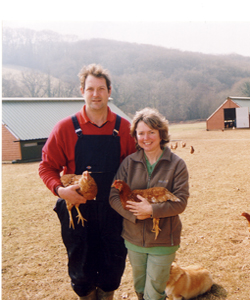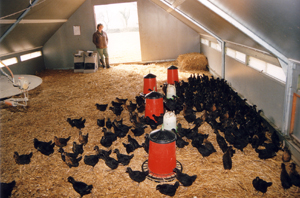
Twenty feet up in the trees is not where you'd normally look for point-of-lay pullets. But that's where at least some of Ben and Cathy Wetherden's birds can be found! It's indicative of the birds' health and vitality, they believe.
As Britain's largest independent organic pullet producers they consider this expression of natural behaviour in a free-range environment is very much part of the system, even if inconvenient at times.
At their 64-acre Eastwood Farm, Hittisleigh, near Exeter in Devon they annually rear 18,000 commercial and traditional birds – such as Black Rocks, Silver Links and Utility Light Sussex – delivering to serious organic customers as far away as Scotland and the east of England. Most have small flocks – 50-200 hens in each house – and supply high-class outlets and restaurants. Famous names include Highgrove House, Yeo Valley and Hugh Fearnley-Whittingstall.
Ben and Cathy are convinced of the value of organic production and see this sector growing. They started off in 1996 with a beef and sheep enterprise but realised it was impossible to earn a living wage on a small acreage and renting a large block of land turned out to be an expensive lesson the year foot-and-mouth struck.

At that time they also grew organic strawberries and this led to an interesting discovery. My sister-in-law appeared to be allergic to strawberries, but was able to eat ours with no reaction," said Cathy. "We concluded that the allergy could only be due to the sprays used on conventionally-grown strawberries and not the fruit itself."
This helped to cement their view that organic production was not 'cranky' and, having kept a few chickens, they decided to specialise in this side of the business using converted cattle sheds. However, all but five of their 28 acres where they previously farmed in the Carey valley were within a flood plain and buying more land in that area was prohibitively expensive, which limited their plans for expansion.
They acquired Eastwood Farm last year and started moving in the autumn. Hilly, wooded and up to 190 m (617 ft) high, it couldn't have been more different from the previous site. It had the advantage of being isolated with the medium-loam, free-draining land down to permanent pasture that had not been farmed intensively for years. This was flagged up by an abundance of wild flowers and confirmed by independent soil tests, so conversion to full organic status under The Soil Association's rules, which will be achieved on 14th May, has been a relatively straightforward process.
However, this idyllic setting was not without problems. There was no dwelling house, no electricity and no buildings, so it was really a case of starting from scratch. A sympathetic Mid-Devon Council was keen to encourage this type of enterprise and led the Wetherdens to believe that, if it was viable, they could obtain planning permission for a house. In the meantime Ben and Cathy and their two children are living in two caravans while establishing the business on the new site.
The accommodation for the chickens, however, is rather more luxurious. Having looked at various houses used by other free-range producers they chose ARM mobile poultry arks and now have18. "We liked their sturdy construction, which was important for our hilly fields, and the fact they were well insulated with a good ventilation system" commented Ben.
He appreciated the value of the side inlets and ridge outlets, a feature not seen on most other houses, which means a good airflow can be achieved even in the hottest weather. Also, the laminated insulation panels allow an uncluttered design which is easy to clean and disinfect, important in organic production where disease is controlled by management rather than drugs.
The houses were assembled on the farm, with some help, after staff from ARM's Staffordshire headquarters showed the Wetherdens how to construct the first one. This saved an estimated £10,800. Ben believes the houses were good value and despite the slopes can easily be pulled by their old 80 hp John Deere tractor. In fact, they have been moved by Land-Rover Discovery. Both Ben and Cathy like the aesthetically-pleasing design which is not intrusive in a favoured landscape.
Day-old organically produced chicks are purchased from British and European hatcheries and 500 are put in each 30' x 18' house, giving a very low stocking density. Houses are allocated one acre of ground apiece and are moved after each batch. To prevent a build-up of disease, every two years houses will be moved to a completely fresh section of the farm.
The chicks are reared under gas brooders for the first 3-5 weeks and because of the danger from buzzards, are not let out until they are 8-10 weeks old.
Of course, setting up from scratch on a new farm has not been without its problems. It was dry when the Wetherdens moved but following a wet autumn they found they had sited one of the houses directly over a spring!
Initially rats caused high mortality. In fact, out of the first batch of 3,000 chicks, they killed 600 – one rat accounting for 235 in a single night. Their holes also channelled water directly into the houses. Both problems were overcome by laying galvanised welded mesh panels on the ground around the outside of the house. This also has the advantage of preventing poaching of the ground when the birds are let out.
Sited across the slopes, the houses cope well with the steep inclines, the biggest difficulty being to get the water-lines level. The houses are not floored but bedded with straw then wood-shavings and normally keep very dry. The chicks are reared to 18 weeks but are for sale from a day old and, where possible, are allowed to range near the ancient hedges, which Cathy says they really appear to enjoy – as indicated by their tendency to fly up into the trees.
Foxes are kept at bay by solar-powered electric fencing. The chickens that venture through the fences are considered "fair game" for the foxes by the Wetherdens but this predator is not, in fact, a major problem. Out of the last batch of 3000 chicks only 30 were unaccounted for.
Ben and Cathy admit that it has been hard work setting up the unit. The worst part has been getting the water to the houses. Pipelines have now been installed to all parts of the farm, but so far only six houses have automatic drinker systems installed.
Feed is not such a problem. An ATV is used to transport bagged organic feed – purchased from Mole Valley Farmers – to the houses without damaging the soil structure. Ad lib feeders made from 45-gallon steel ex-fruit-juice drums set on plastic trays were purchased cheaply at £12.50 apiece.
The biggest problem has been the rise in the cost of feed – up from £286 a year ago to £398 per tonne. This, they say, has added £1 to the cost of rearing each pullet, a sum which is hard to pass on to customers in a single hit, they point out.
Disease has not been an issue. They believe that, having a stocking rate even lower than that required by the Soil Association, provides good welfare which ensures low stress and goes a long way to maintaining bird health. Homeopathic remedies are available if necessary.
They pride themselves on their service and individual advice. Ben does 60,000 miles a year delivering the pullets to customers personally. In return, they have retained customer loyalty while converting to full organic status on their new farm and have a growing business. They plan to add a further six houses in the future.
Customer satisfaction must be high because they have even received postcards from their hens in their new homes!
Having provided ideal conditions for their hens, Ben and Cathy are now looking forward to improving their own environment. A temporary log cabin is to be delivered shortly, pending planning permission for a proper home, which they
